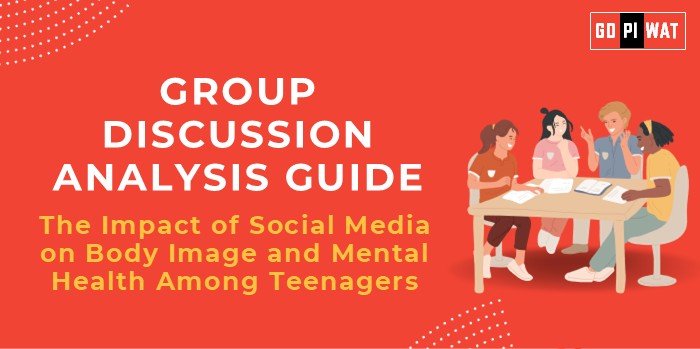📋 Group Discussion (GD) Analysis Guide: The Impact of Social Media on Body Image and Mental Health Among Teenagers
🌐 Introduction to the Topic
Opening Context:
Social media has transformed the way teenagers interact and perceive themselves, creating a profound impact on body image and mental health. With billions of active users globally, the discussion about its effects is pivotal for fostering healthier digital habits.
Topic Background:
The rise of platforms like Instagram, TikTok, and Snapchat has fueled a culture of curated perfection, affecting teenagers’ self-esteem. This phenomenon has drawn attention from psychologists, educators, and policymakers, particularly due to the increasing prevalence of anxiety, depression, and eating disorders linked to online comparisons.
📊 Quick Facts and Key Statistics
- 📱 Teen Social Media Use: 95% of teens report using social media regularly (Pew Research, 2023).
- 💔 Mental Health Impact: 35% of teens report feeling anxious or depressed due to social media (APA, 2023).
- 📸 Body Image Distress: 47% of teenage girls feel pressured to look perfect due to social media (Common Sense Media, 2023).
- ⏰ Time Spent Online: Average daily screen time for teens is 3 hours on social media alone (Statista, 2024).
👥 Stakeholders and Their Roles
- 🏢 Social Media Companies: Algorithms promoting engagement often amplify unrealistic body standards.
- 👨👩👧 Parents & Educators: Play critical roles in promoting media literacy and monitoring usage.
- 🧑🎓 Teenagers: Active participants and consumers who must navigate these challenges.
- 🏛️ Governments & NGOs: Advocate for regulations and awareness campaigns to address these issues.
🏆 Achievements and Challenges
✨ Achievements:
- 📢 Increased Awareness: Mental health discussions are now mainstream, partially thanks to social media advocacy.
- 🤝 Support Communities: Online platforms provide spaces for body positivity and mental health awareness.
- 📚 Educational Tools: Campaigns like RealNotPerfect encourage teens to embrace authenticity.
⚠️ Challenges:
- 🎭 Unrealistic Standards: Filters and editing tools perpetuate distorted body ideals.
- 💻 Cyberbullying: One in three teens experiences online bullying, worsening mental health.
- 🌏 Global Comparisons: Platforms in countries like South Korea report heightened pressures due to cultural beauty standards.
📚 Case Study:
- 🇬🇧 The UK’s Online Safety Bill: Regulates harmful content, aiming to protect young users from body image-related distress.
💬 Structured Arguments for Discussion
- ✔️ Supporting Stance: “Social media has created spaces for advocacy, allowing teenagers to access mental health resources and build supportive networks.”
- ❌ Opposing Stance: “The pervasive nature of curated content on social media leads to body dissatisfaction, anxiety, and depression among teenagers.”
- 🔄 Balanced Perspective: “While social media offers platforms for expression and support, its unregulated aspects pose significant risks to teenage mental health.”
🎯 Effective Discussion Approaches
🚀 Opening Approaches:
- 💡 Quote: “Comparison is the thief of joy” – Theodore Roosevelt.
- ❓ Question: “Can social media be restructured to promote mental well-being instead of fostering insecurities?”
- 📊 Statistic-Driven: “Nearly 50% of teenage girls report body image distress due to social media.”
💡 Counter-Argument Handling:
- ✔️ Rebuttal: Emphasize the need for media literacy to mitigate harmful effects.
- 📈 Support: Highlight successful campaigns like BodyPositivity.
🔍 Strategic Analysis of Strengths and Weaknesses
- 💪 Strengths: Connectivity, advocacy for mental health.
- ⚖️ Weaknesses: Algorithmic biases, cyberbullying prevalence.
- 🌱 Opportunities: Tech-driven solutions like AI content moderation.
- ⚠️ Threats: Rising anxiety rates, lack of robust regulations.
🎓 Connecting with B-School Applications
🌐 Real-World Applications:
- 📈 Designing corporate social responsibility (CSR) campaigns addressing digital mental health.
- 🤖 Leveraging AI to develop ethical social media algorithms.
🤔 Sample Interview Questions:
- ❓ “How can technology be leveraged to promote healthier social media use among teenagers?”
- ❓ “Discuss the ethical implications of algorithm-driven content recommendations.”
💡 Insights for Students:
- 🔍 Explore intersections between technology and psychology.
- 📊 Analyze marketing strategies that prioritize ethical engagement.


